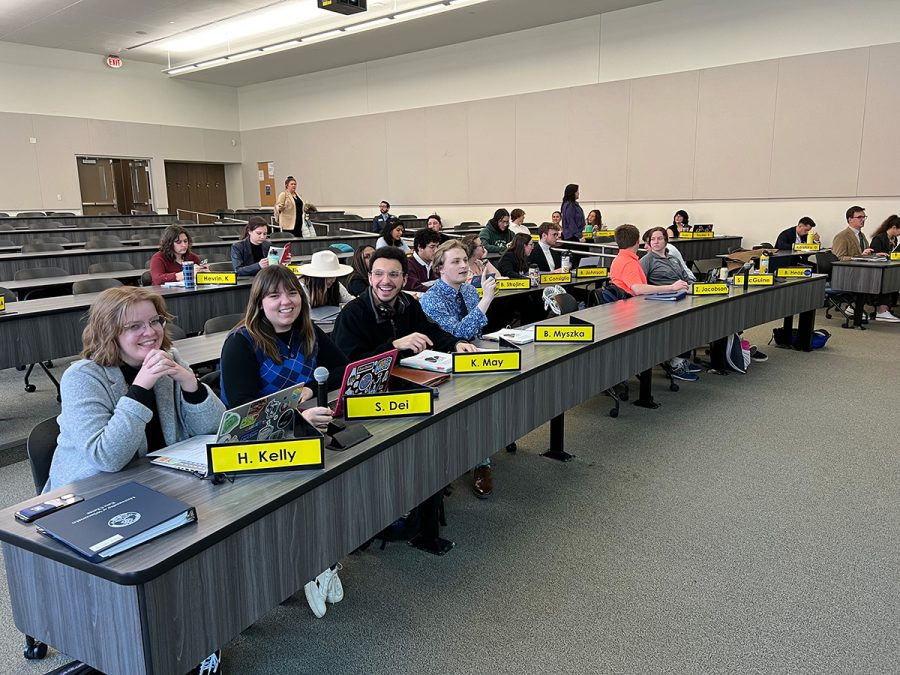2023-24 BCDT funding package approved
Blugold Commitment Differential Tuition’s role on campus
Photo by Maddie Kasper
Members of the Student Senate before voting on the BCDT package.
The Student Senate voted on the Blugold Commitment Differential Tuition proposal package on March 27 and they approved the package with a vote of 31-0-2.
Stephanie Jamelske, the budget officer for Academic Affairs, said BCDT is funding provided to several programs around campus that allow for more resources and opportunities for students.
During a presentation for the senate, Jamelske said for the 2023-2024 school year, the BCDT budget is $10.17 million with 48% spent on programming, 30% on financial aid and 22% on the provost’s initiatives.
Not all of the budgets are spent each year, however. The past three years have each had over a million dollars of unspent BCDT. Much of the budget information was monitored by Jamelske, who oversees BCDT and is in charge of the annual review process.
Before her, the program was overseen by her predecessor, Bob Bolles. Every year, a few of the programs funded by BCDT have their budget reviewed during a meeting with the Academic Affairs Commission.
This meeting involved Jamelske along with Mary Hoffman and Louisa Rice, both interim associate vice chancellors for Academic Affairs, and the Student Senate Blugold Commitment Differential Tuition Committee.
Jamelske then gave a presentation to the senate, and Academic Affairs Commission Director Sahana Suresh introduced bill 66-B-10 to approve the 2023-24 BCDT funding proposal package. Suresh is a fourth-year human resources management student with an information systems minor.
Jamelske said the four programs reviewed this year were positions in the Advising, Retention and Career Center, the nursing simulation technology, the first-year experience programs and retention program, and Suicide Prevention And Research Collaboration (SPARC).
She also said the programs are split up into groups and reviewed on a five-year rotation. BCDT was started in 2010 and it expanded from the original program, Differential Tuition, which was formed in 1996.
Jamelske said a lot has changed since BCDT was first applied and students have since lost an understanding of the program.
“I want to make sure that every student still knows how important this program is for their undergraduate education and what a difference it’s made for this university,” Jamelske said.
BCDT has helped programs such as the Center For Writing Excellence and the Academic Skills Center be able to pay for extra resources. Hoffman supervises these programs and said the money from BCDT helps them pay for tutors.
“It provides that high-impact learning experience for the student who is the tutor or the coach or the intern but it also provides the much-needed service to the student who is being tutored or coached or working on their writing,” Hoffman said.
The Center For Writing Excellence last had its funding reviewed during the 2020-2021 school year while the funding for the Academic Skill Center was reviewed in the 2021-2022 school year.
BCDT also helps students by funding student research and making immersion experiences more affordable for students. One of those programs is the Civil Rights Pilgrimage, which Hoffman said can be very significant for students.
“We have some immersions that are specific to student identity and they’re not for students who identify with a particular identity but they are often meaningful for those students,” Hoffman said.
Curtin can be reached at curtinem5864@uwec.edu.

Liz Curtin is a second-year journalism student and this is her fourth semester at The Spectator. Her favorite movie is “The Eternals" and in her spare time she likes to question her existence.

Maddie Kasper is a fourth-year journalism and political science student and this is her seventh semester at The Spectator. She covered the UW-Eau Claire Student Senate for three consecutive semesters and dreams of being a national political correspondent, but also loves sports photography. She adores poems about oranges, obsessively logging movies on Letterboxd and the Half Price Books on the east...


